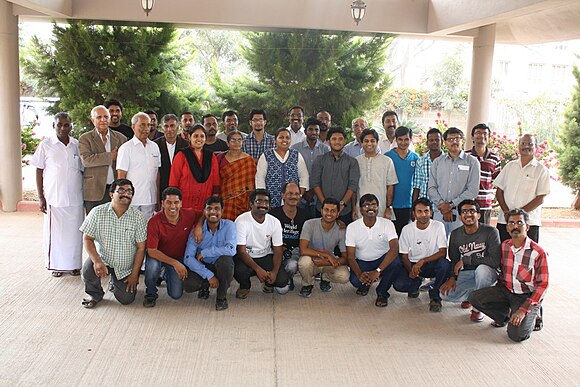
February’s Train the Trainer program—which aims to increase the number of new editors and ‘ambassadors’ for the movement at large—proved a rewarding experience for attendees. Photo by U.B. Pavanaja, freely licensed under CC-BY-SA 4.0.
It is heartening to report that many Wikimedia projects in Indian languages have sustained, and even experienced an upward trend in, editor engagement. However, in terms of content creation, the majority of these projects are still facing grave challenges that put their very existence at risk.
Pageview statistics for Indian-language Wikipedias are pleasantly surprising. Almost all exceed one million unique views every month—but despite these positive readership figures, very few of these readers become actively involved in the project’s communities. There is almost no increase in the number of active and very active editors on a month-to-month basis.
These statistics are alarming. They suggest a very real possibility of volunteer burnout, a dearth of second-generation editors who might continue established work, and, perhaps most importantly, the projects losing their reputation as frequently-updated and reliable encyclopedias.
The most realistic way of dealing with this problem is to bring in new volunteers who will be guided by more experienced users. They would, eventually, fill the shoes of senior Wikimedians and continue to fight for free and open knowledge.
The Centre for Internet and Society – Access to Knowledge (CIS-A2K)—a campaign to promote the fundamental principles of justice, freedom, and economic development—realised as part of its needs-assessment program that although outreach activities are being conducted to attract more volunteers to Wikipedia, they had not been as successful as expected.
To address this problem, CIS-A2K came up with the ‘Train the Trainer’ program (TTT). The program is designed to teach volunteers essential skills and abilities to, in turn, train the general public on all things Wikipedia.
These volunteers, or “trainers,” develop key competencies that will allow them to conduct a successful outreach workshop, such as public speaking, presentation skills, peer-to-peer learning, effective communication, reporting, and followup strategies.
To take part in the TTT program, it is imperative that participants be active Wikipedians. CIS-A2K is angling TTT as both a skill-building initiative amongst Indian-language Wikimedians, as well as a platform where Indian-language Wikipedians can meet and greet each other in-person. This allows participants to interact with Wikimedians from many different communities, to understand their nature of engagement, and share the challenges they have faced and overcome.
The contextual learning and exchange of ideas at these events, similar to editathons, are very special. They help participants feel like they are a part of both their linguistic community and a greater Indian-language community, opening up new opportunities of collaboration, project development, and friendship.
TTT intends to train Indian-language Wikimedians into effective ambassadors of the movement—keen and able to spread the goals and mission of the open knowledge movement. The program also strives to combine best practices from all over the world, taking cues from various chapters, user groups, and thematic organisations. It builds bridges between communities in terms of communication, encouraging partnerships and collaborations that can result in long term rewards.
Tanveer HasanProgramme OfficerCIS-A2K

Can you help us translate this article?
In order for this article to reach as many people as possible we would like your help. Can you translate this article to get the message out?
Start translation